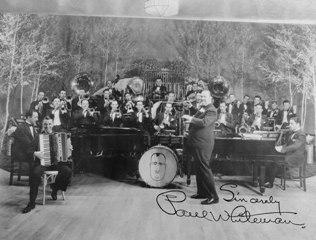Paul Whiteman and His Orchestra 1920–1929
Paul Whiteman and His Orchestra 1920–1929

01 Avalon-Just Like a Gypsy 02 Dear Old Southland 03 Oriental Fox Trot 04 Stumbling 05 They Call It Dancing 06 Three O'Clock in the Morning 07 Sweet One 08 By the Shalimar 09 Chansonette 10 Linger Awhile 11 No More Worryin' 12 Valencia[MusicBrainz (recording)] 13 Soliloquy 14 When Day Is Done 15 S'posin' 16 Laughing Marionette
Paul Whiteman and his Orchestra was the most popular band of the 1920s and represented the apex of jazz to the general public. Over the years, critics and some musicians like Eddie Condon, have not had kind words to say about the band and have tended to represent Whiteman as a bad influence on the music in his attempts to "Make a lady out of Jazz". The title of "The King Of Jazz" which Whiteman was billed as seems somewhat politically incorrect these days, but in the 1920s he dominated the scene and hired the best White hot musicians like Bix Beiderbecke, Frankie Trumbauer, Eddie Lang, Joe Venuti, Jack Teagarden and many more to play in his band. Paul Whiteman greatly enriched American music by commissioning George Gershwin to write Rhapsody In Blue which became his orchestra's signature tune. He also "discovered" Bing Crosby and featured him in Paul Whiteman's Rhythm Boys, and gave the career of Hoagy Carmichael a boost, by recording several of Hoagy's songs early in his career. Jazz singer Mildred Bailey also rose to fame in the orchestra in the 1930s. So, what was it that has led Whiteman's name to be dragged through the mud in the annals of Jazz history? Paul Whiteman being the most popular Jazz band leader of the Jazz Age is blamed for the racism in America that denied African-American musicians the credit that they deserved in the history of Jazz. If there is such a thing as the "King of Jazz" the title belongs to Louis Armstrong, although that may not have been clear to most people in the 1920s. Whiteman is also criticized for not hiring African-American musicians to play in his band, but this argument ignores the commercial realities of the period. Paul Whiteman was clearly not a racist. He commissioned Duke Ellington to write for his modern music series, recorded with Paul Robeson and Billie Holiday, and hired Don Redman as an arranger in the 1930s and was generally held in high regards as a person by musicians both Black and White. The worst that can be leveled at Whiteman was that he was a businessman. His band was wildly successful financially, and quite often his music sounds commercial and sweet, especially when compared to the top African-American Jazz bands of the era. Despite that, Whiteman made some very good Jazz records in the 1920s such as San, Washboard Blues, Mississippi Mud, Whiteman Stomp, Wang Wang Blues and I'm Coming, Virginia. His interest in making symphonic Jazz led the way for generations of Jazz musicians as diverse as Miles Davis, Gil Evans, The Modern Jazz Quartet and Winton Marsalis, who may not directly cite Whiteman as an influence, but have certainly walked down the path that he blazed at points in their careers. --- redhotjazz.com
download (mp3 @144 kbs):
uploaded yandex 4shared mega gett mediafire solidfiles zalivalka cloudmailru oboom
Last Updated (Thursday, 02 April 2015 15:23)








